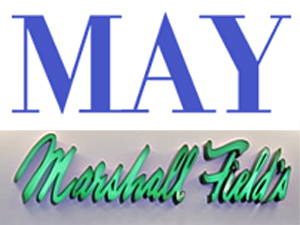|
Audio
Photos
More from MPR
Your Voice
|
New ownership, same Marshall Field's
June 10, 2004
 |
| May Department Stores Company wants Marshall Field's for its upscale appeal. Analysts say the trick for May is to keep it that way. (MPR photo illustration) |
St.Paul, Minn. — Marshall Field's shoppers, imagine yourselves a few months in the future: It's late summer and you're heading toward the familiar forest green sign for a back-to-school shopping trip. But distant department store giant May Company is in charge now, a multi-chain company famous -- or is it notorious? -- for bland, middle-of-the-road retailing. You have to wonder what changes are waiting behind the entrance.
"We want to operate Marshall Field's just as Marshall Field's is today," says May spokeswoman Sharon Bateman. She says if you like Marshall Field's the way it is now, you've got nothing to worry about.
"I think we have acquired a very successful operating brand, and we want that not to change."
|
I think we have acquired a very successful operating brand, and we want that not to change.
- May spokeswoman Sharon Bateman |
Bateman says May has no plans to change the way Marshall Field's looks or feels to the customer.
The Marshall Field's formula has not been a stellar performer for its current owner; Target Corporation is selling it after seeing sales drop for four straight years. But for May Company, Marshall Field's fills an important niche. Geographically, it gets them a foothold in the upper midwest. Perhaps more important, it adds an upscale name to their stable of 11 chains.
Some analysts say if anything it is Marshall Fields that will change its new owner. Bateman says May Company plans to use Marshall Field's style and vendor connections to "upscale the merchandizing" in its other stores.
Don Hogsett, business editor of the trade newspaper Home Textiles Today, says these changes could shake up the industry.
"They could take the May company 'A' stores, their better stores, turn them into Marshall Fields and create a new Bloomingdale's or a new Nordstroms, if you will," Hogsett says. "That could be exciting, and that could invigorate department store retailing. It all depends on what they do -- whether they try to squeeze it into the old shoe, or make something new out of it."
May Department Stores has tried that "old shoe" approach. In 1986 the company acquired Lord & Taylor, an upscale clothier based in New York. Over the years, some patrons complained that Lord & Taylor went distinctly downscale, playing to the middle class shoppers May knows best.
Bob Buchanan, retail analyst for A.G. Edwards, thinks May has learned from that mistake.
"The term people in the industry used was that May had 'May-o-nized' Lord & Taylor -- that's going to be the fear" with Marshall Field's, he says.
"I don't think that's going to be realized. I think May wants to keep Marshall Field's a distinctive entity, so I don't look for wholesale changes in terms of the quality, the fashion, the price-point."
That said, Buchanan does expect there will be many changes behind the scenes. "May paid a lot of money, $3.24 billion. I think frankly that was more than they should have paid. And so to make the numbers work, to make the deal work, to get a return on that investment, they're going to have to significantly boost returns from Marshall Fields."
To Buchanan, that means two things. The first is job cuts in Marshall Field's management. Buchanan says its inevitable, though the company says for now everyone is staying on. Second, analysts expect Marshall Field's to benefit from May's experience handling inventory. A tight supply line from the warehouse to the rack is a May Company hallmark.
Any changes shoppers do see are likely to be gradual. For instance, May Company clothing lines such as "Ideology" will probably appear on the rack.
May Company spokeswoman Bateman says that over time, no company would promise to leave a formula untouched.
"There is always evolution in the department store business," she says. "Department stores either evolve or they die."
In other words, nothing is forever. But for now, shopping Marshall Field's will remain what we've come to expect.
|
News Headlines
|
Related Subjects
|
